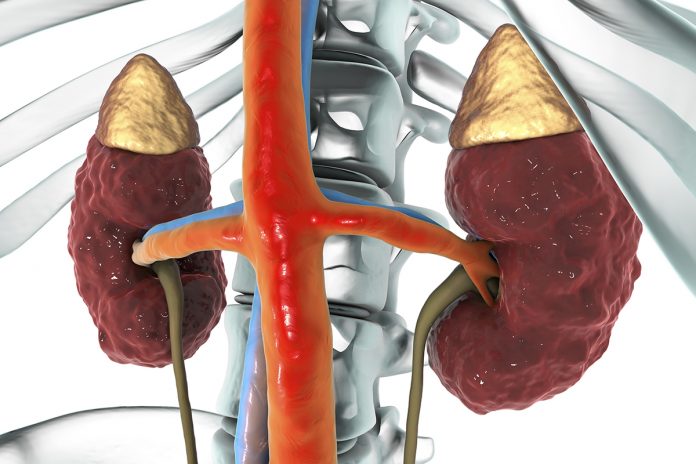Here, Dr Masanori Katakura from the Laboratory of Nutritional Physiology, explains the importance of keeping the kidneys healthy, as well as the surprisingly common condition, chronic kidney disease (CKD)
The kidneys are an important organ to maintain the homeostasis of body fluids, regulation of blood pressure, body fluid volume, production of red blood cells and to keep bones strong and healthy. Remarkably, given the importance of the kidneys, it is entirely possible to live a full and healthy life with just one kidney.
When the kidneys do not work as well as they should, this is referred to as chronic kidney disease (CKD) or chronic renal failure (CRF). CKD is a surprisingly common condition which is often associated with aging. According to the National Kidney Foundation, 10% of the global population is affected by CKD, with more than 2 million people currently receiving treatment with dialysis or a kidney transplant. It is clearly a global health problem that has a high economic cost. While it is widely known that CKD is an independent risk factor for cardiovascular disease, it is perhaps less well known that kidney failure can have significant negative impacts on the heart, brain, retinas and liver.
Changes in inflammatory status in the plasma and kidneys in the rat chronic renal failure model
To elucidate the relationships between inflammation and renal functions, the rats had 5/6 kidneys removed when they were 11-weeks old. Every four weeks, the rats were housed in an individual metabolic cage and their urine was collected for 24 hours. Sixteen weeks after surgery, plasma and kidneys were collected for biochemical and histological analysis. Urinary albumin excretion was shown to be gradually increasing in the renal failure group, as compared to the control sham group. Reactive oxygen levels and lipid peroxide levels in the kidney, however, did not differ at 16 weeks after surgery. Lipid peroxide levels in the plasma of the renal failure group significantly decreased compared with the control group at four weeks after surgery – but not in the plasma at 16 weeks. The negative correlation was found between creatinine clearance and lipid peroxide levels in plasma at 4 weeks after surgery. Tumour necrosis factor (TNF)-α and transforming growth factor (TGF)-β1 levels in the kidney at 16 weeks significantly increased in the renal failure group compared with the control group. The positive correlation was found between creatinine clearance and IL-6. The negative correlation was found between creatinine clearance and TNF-α or TGF-β1. The positive correlation was between urinary albumin at 12 weeks and TGF-β1. These results have indicated that inflammation an important factor to determine renal functions after that surgery takes place.
Effects of chronic renal failure on cognitive function and neurogenesis in rats
It is reported that the risk of dementia in dialysis patients is higher than that in healthy individuals. Iwata et al. recently reported a decline in CKD grade was associated with a faster rate of decline regardless of amyloid pathology in women (Alzheimer’s Dement (NY). 12(4)765-774, 2018). However, the detailed mechanism underlying this relationship remains poorly understood. Our team examined the cognitive function and behaviour of the rat renal failure models that were prepared by function by removing the whole right kidney, the left kidney ligated one part of the renal artery and blocked the blood flow, using histological and behavioural tests. There was a decrease in creatinine clearance and an increase in urinary albumin excretion in the renal failure group compared to that of the control group. Five months following surgery, brains were harvested and fixed using 4% paraformaldehyde, following which frozen sections were prepared using a cryostat and subjected to fluorescent immunostaining (Ki67, Iba-1). The abundance of Ki67 positive cells, proliferating cells and Iba-1 positive cells which are expressed in monocyte or macrophage, in the hippocampus, was evaluated. The number of Ki67-positive cells in the hippocampus was lower in the renal failure group than in the control group. The number of Iba-1 positive cells in the hippocampus tended to increase in the renal failure group compared to the control group. Behavioural differences between the control group and the renal failure group were observed using the novel object cognitive test for the investigation of learning and memory. The proportion of search time for the new object significantly decreased in the renal failure group compared to the control group, indicating a decline in learning and memory function in the renal failure group. These results have suggested that increased inflammation in the hippocampus caused by chronic renal failure may suppress the number of new-born cells, called neurogenesis, in the hippocampus, resulting in reduced cognitive function.
Through these experiments, we will clarify the relationship between the kidney and other organs and continue basic research to help reduce complications due to the progression of renal failure. To keep the kidneys healthy leads to extending the healthy life expectancy.
Please note: This is a commercial profile











